If a tire goes flat, avoid further tire and wheel damage by driving slowly to a level place. Turn on your hazard warning flashers.
Caution: Changing a tire can be dangerous. The vehicle
can slip off the jack and roll over or fall on you or other people. You and they could
be badly injured or even killed. Find a level place to change your tire. To help prevent
the vehicle from moving:
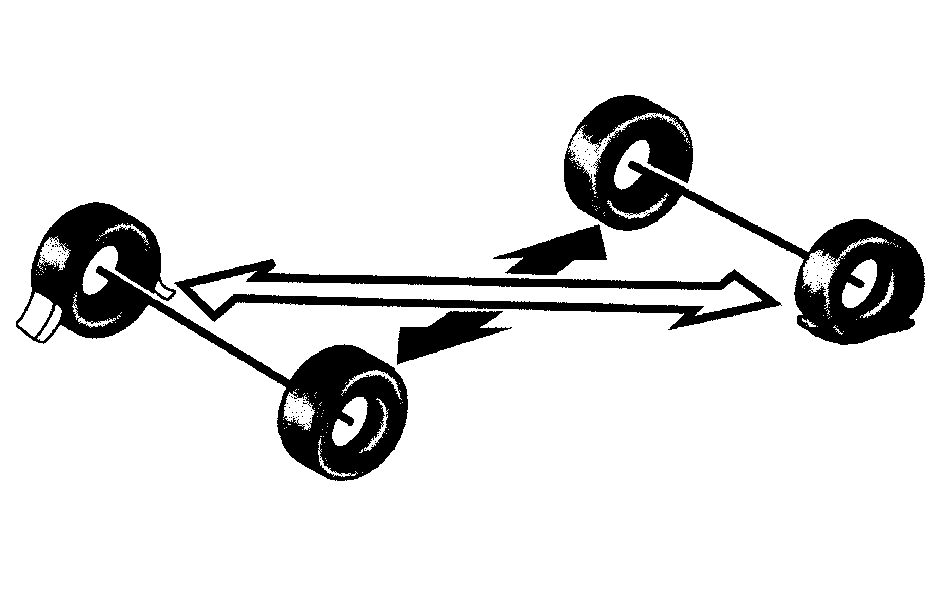
The following steps will tell you how to use the jack and change a tire.
Removing the Spare Tire and Tools
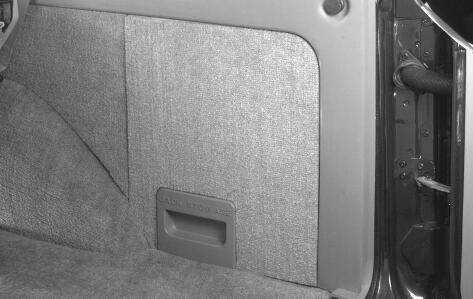
The jacking equipment you'll need is stored by your vehicle's rear doors, along the passenger's side wall.
- Remove the jack cover by pulling it away from the side wall and down to release the tabs securing the top of the cover.
- Remove the wheel blocks by turning the top nut counterclockwise. Remove the nut and washer, then pull the wheel blocks off the bolt.
- Push down on the bolt and remove the hooked end from the slot. Slide the jack toward the front of the vehicle and lift it from the mounting. Remove the extension and the ratchet from the pouch.
- Your compact spare tire is stored underneath the rear of your vehicle. You will use the ratchet and extension to lower the compact spare tire.
- Attach the ratchet to the extension,, with the DOWN side facing you. The extension has a socket end and a flat chisel end.
- Put the flat end of the extension on an angle through the hole in the rear door frame, above the bumper. Be sure the flat end connects into the hoist shaft.
- Turn the ratchet counterclockwise to lower the compact spare tire to the ground. Keep turning the ratchet until the spare tire can be pulled out from under the vehicle.
- When the tire has been lowered, tilt the retainer plate at the end of the cable and pull it through the wheel opening.
- Pull the tire out from under the vehicle.
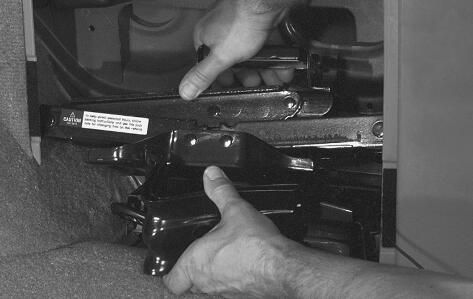
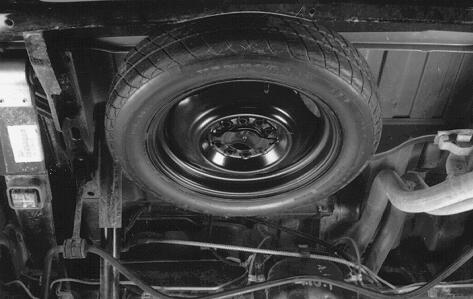
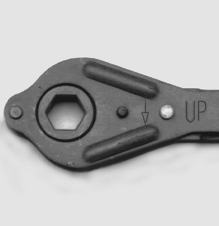
The ratchet has an UP side.
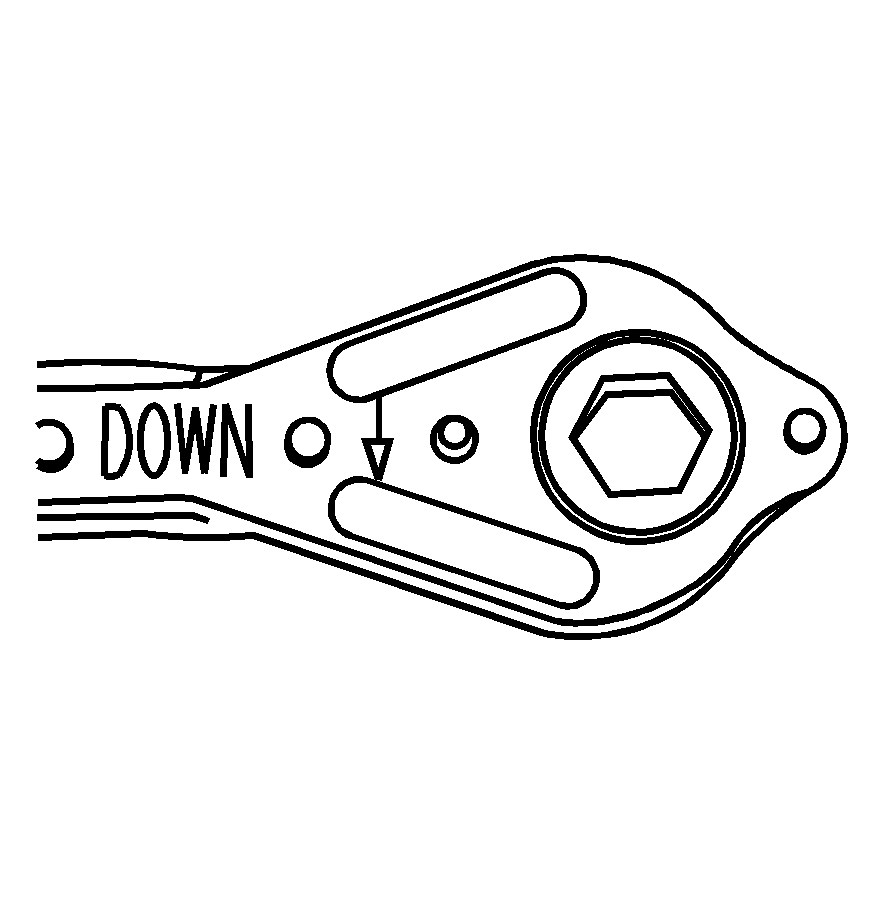
It also has a DOWN side.
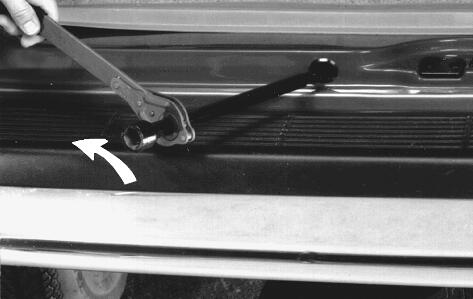
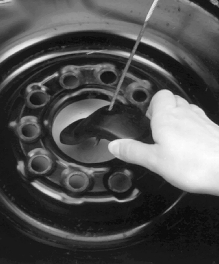
Notice: If you drive away before the spare tire or secondary latch system cable has been reinstalled, you could damage your vehicle. Always reinstall this cable before driving your vehicle.
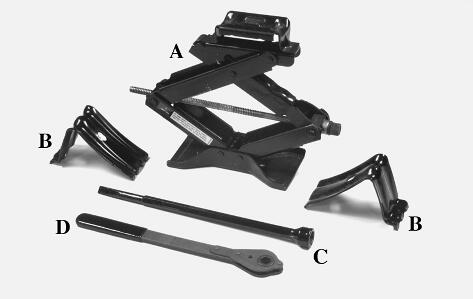
The tools you'll be using include the jack (A), wheel blocks (B), extension (C) and ratchet (D).
Removing the Wheel Covers
You will have to take off the hub caps to reach the wheel nuts.
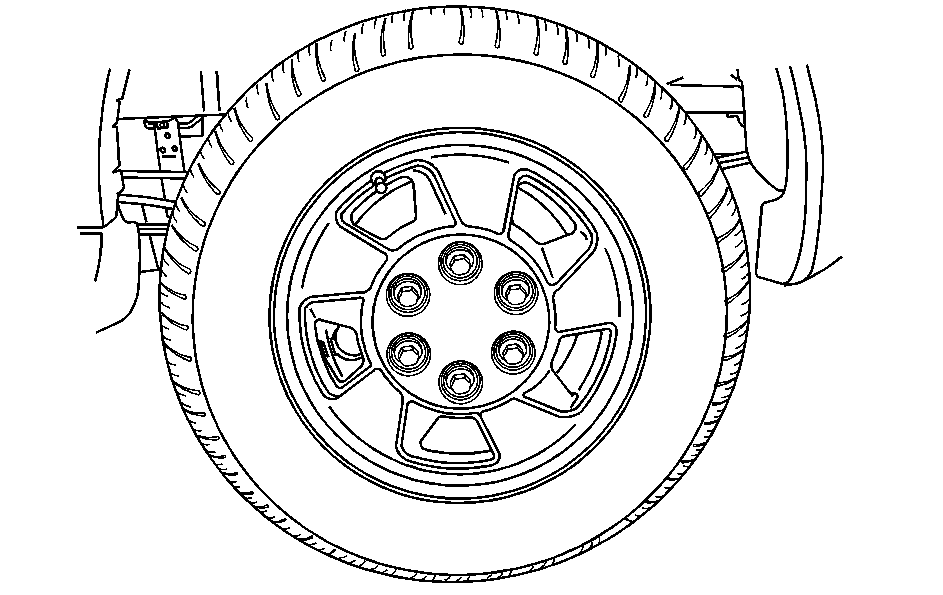
If your vehicle has plastic wheel nut caps, loosen them by turning the wheel wrench counterclockwise. The wheel nut caps are designed to remain with the center cap. Remove the center cap.
If the wheel has a smooth center piece, place the chisel end of the wheel wrench in the slot on the wheel and gently pry it out.
Removing the Flat Tire and Installing the Spare Tire
- Before you start, block the front and rear of the tire farthest away from the one being changed. Then put your compact spare tire near the flat tire.
- With the DOWN side facing you, turn the ratchet and socket to loosen all the wheel nuts counterclockwise. Don't remove them yet.
- The jack has a bolt on the end. Attach the socket end of the extension to the jack bolt.
- Attach the ratchet to the extension with the UP side facing you.
- Turn the ratchet clockwise. That will raise the jack lift head a little.
- Position the jack under the vehicle.
- Raise the vehicle by turning the ratchet clockwise. Make sure the UP mark faces you. Raise the vehicle far enough off the ground so there is enough room for the compact spare tire to fit underneath the wheel well.
- Remove all the wheel nuts and take off the flat tire.
- Put on the compact spare tire. Put the nuts on by hand. Make sure the cone-shaped end is toward the wheel. Tighten each nut by hand until the wheel is held against the hub. If a nut can't be turned by hand, use the extension and see your dealer as soon as possible.
- Lower the vehicle by turning the ratchet counterclockwise. Lower the jack completely.
- Tighten the wheel nuts firmly in a crisscross sequence as shown. Turn the ratchet clockwise with the UP mark facing you.
- Remove the wheel blocks.
Caution: Getting under a vehicle when it is jacked up is dangerous. If the vehicle slips off the jack you could be badly injured or killed. Never get under a vehicle when it is supported only by a jack.
Caution: Raising your vehicle with the jack improperly positioned can damage the vehicle and even make the vehicle fall. To help avoid personal injury and vehicle damage, be sure to fit the jack lift head into the proper location before raising the vehicle.
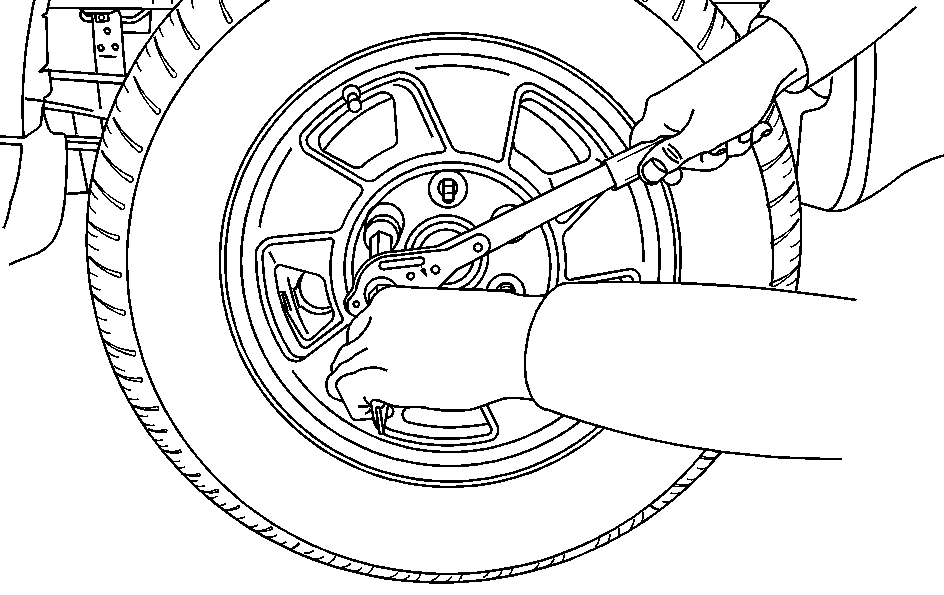
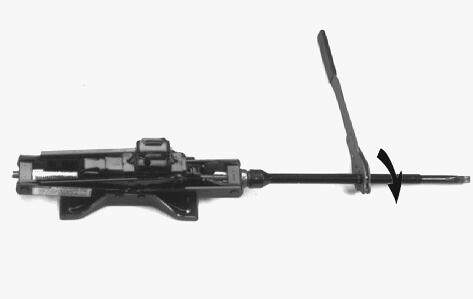
Front Position
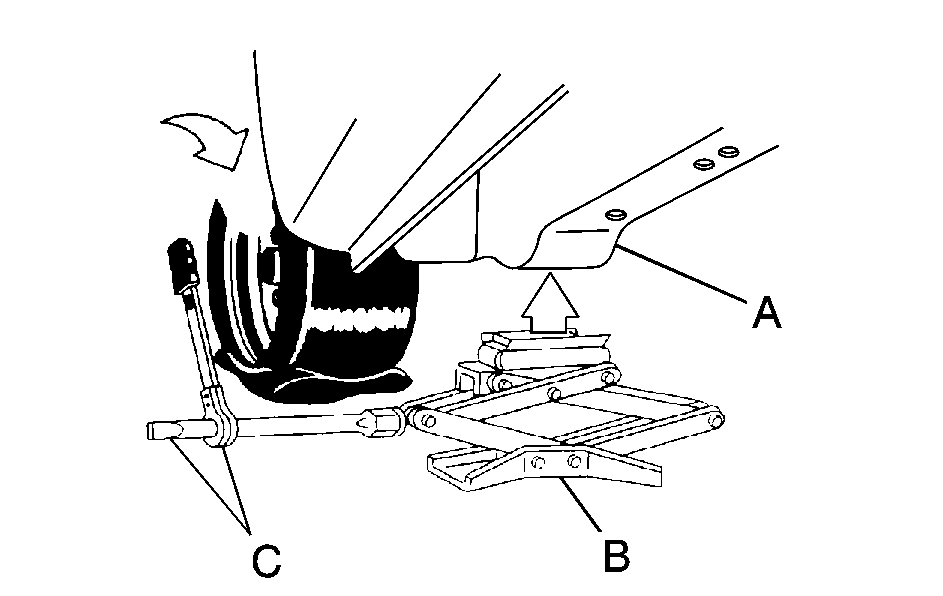
Front Jack Location
Jack
Ratchet and Extension
Rear Position
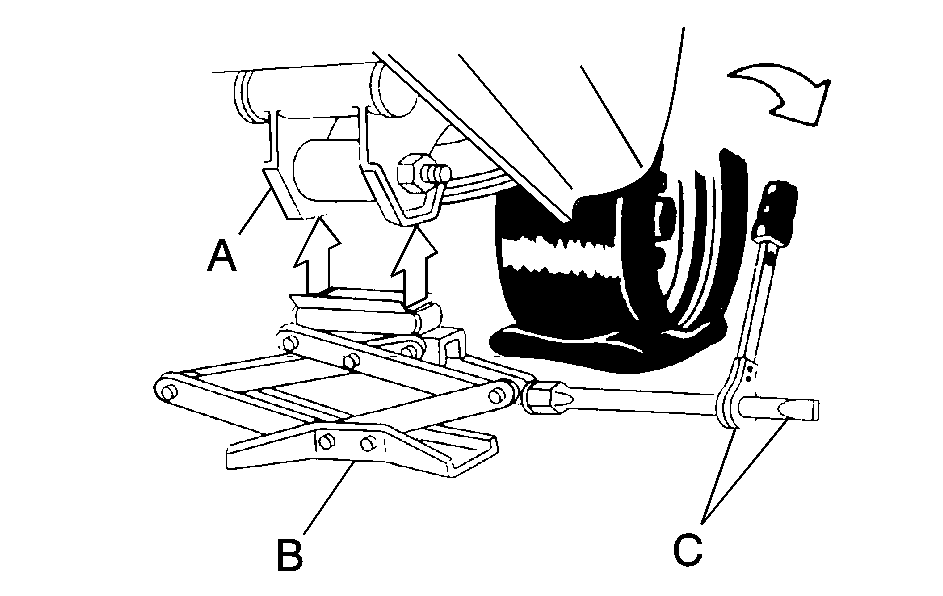
Rear Jack Location
Jack
Ratchet and Extension
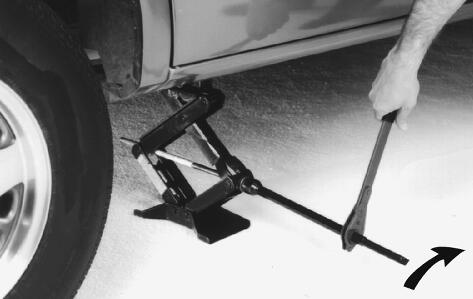
Remove any rust or dirt from the wheel bolts, mounting surfaces and spare wheel.
Caution: Rust or dirt on a wheel or other parts to which it is fastened, can make the wheel nuts become loose and eventually the wheel could come off and cause a crash. Always remove all rust and dirt from wheels and other parts.
Caution: Never use oil or grease on bolts or nuts because the nuts might come loose. The vehicle's wheel could fall off, causing a crash.
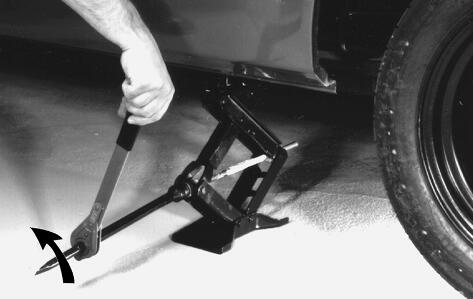
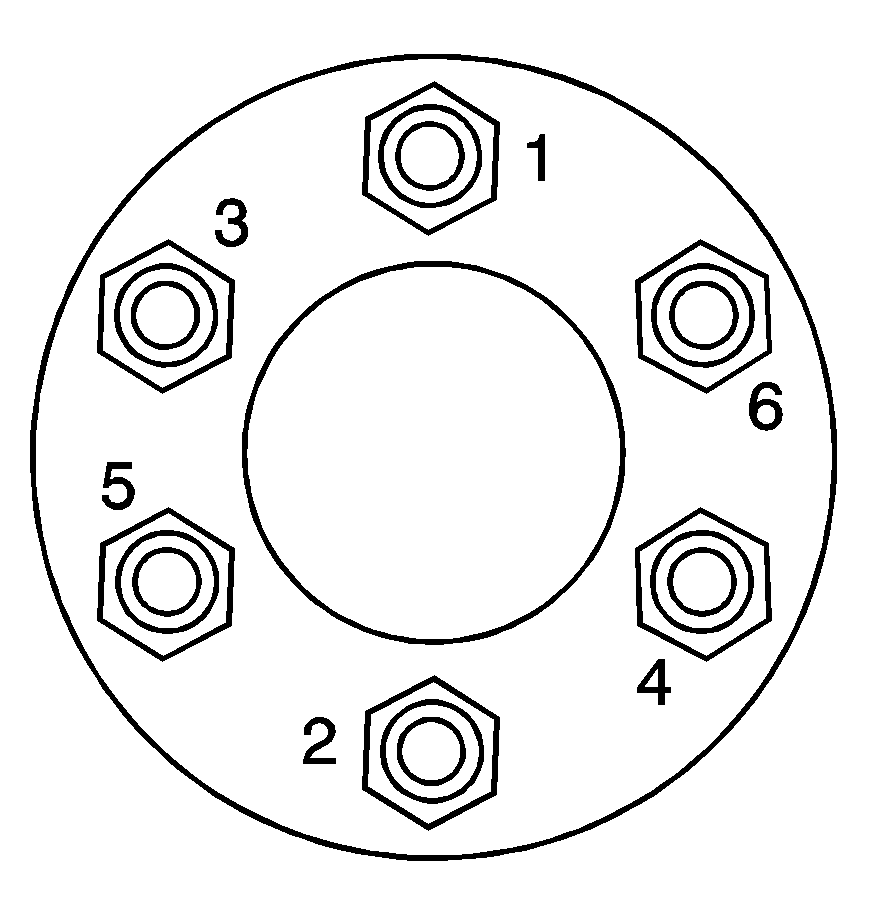
Caution: Incorrect or improperly tightened wheel nuts can cause the wheel to come loose and even come off. This could lead to a crash. If you have to replace them, be sure to get new original equipment wheel nuts. Stop somewhere as soon as you can and have the nuts tightened with a torque wrench to the proper torque specification. See Capacities and Specifications for wheel nut torque specification.
Notice: Improperly tightened wheel nuts can lead to brake pulsation and rotor damage. To avoid expensive brake repairs, evenly tighten the wheel nuts in the proper sequence and to the proper torque specification. See Capacities and Specifications for the wheel nut torque specification.
Notice: Wheel covers will not fit on your vehicle's compact spare. If you try to put a wheel cover on the compact spare, the cover or the spare could be damaged.
Storing a Flat or Spare Tire and Tools
Caution: Storing a jack, a tire, or other equipment in the passenger compartment of the vehicle could cause injury. In a sudden stop or collision, loose equipment could strike someone. Store all these in the proper place.
- Put the flat tire on the ground at the rear of the vehicle with the valve stem pointed down.
- Tilt the retainer plate downward and through the wheel opening. Make sure it is fully seated across the underside of the wheel. Attach the ratchet, with the UP side facing you, to the extension.
- Put the flat end of the extension on an angle through the hole in the rear door frame, above the bumper.
- Raise the tire fully against the underside of the vehicle by turning the ratchet/wheel wrench until you hear two clicks or feel it skip twice. The spare tire hoist cannot be overtightened.
- Make sure the tire is stored securely. Push, pull, and then try to rotate or turn the tire. If the tire moves, use the ratchet/wheel wrench to tighten the cable.
The compact spare is for temporary use only. Replace the compact spare tire with a full-size tire as soon as you can. See Compact Spare Tire . See the storage instructions label to restore your compact spare properly.
Return the jacking equipment to its proper location.
